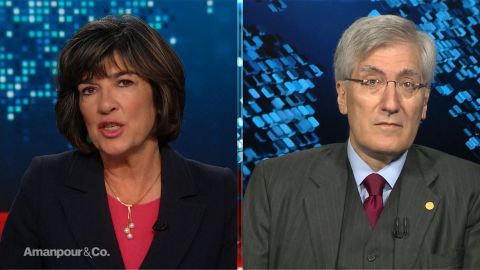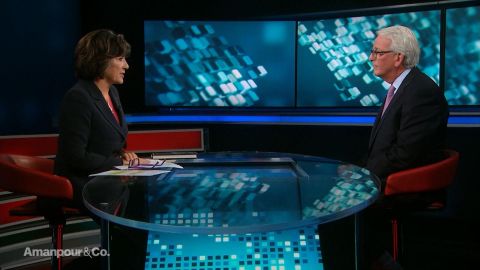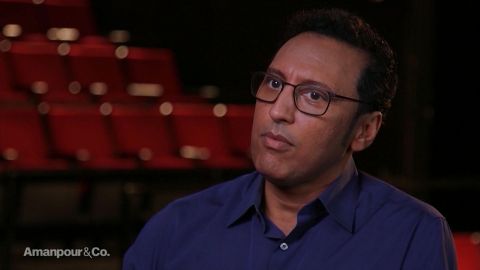Read Transcript EXPAND
ALICIA MENENDEZ: Thanks so much for being with us.
AASIF MANDVI: Oh, thank you.
MENENDEZ: So what is this play about?
MANDVI: Sakina’s Restaurant is a story of Indian-Muslim immigrant family that owned a restaurant in Manhattan on Sixth Street, down in East Village. The little story of the play is a young man from India shows up to be a waiter in this restaurant and his journey — he’s completely open excited about being in America and he’s like this, you know, wide-eyed kid almost.
(BEGIN VIDEO CLIP)
UNIDENTIFIED MALE: Oh, hello. How are you? Oh my goodness. I made it. Here I am. Oh my God. This New York is a crazy place. Oh. But welcome. I am the manager here. [13:45:00] OK. I’m not really the manager, I am the owner. No, no, no, I’m not the owner.
(END VIDEO CLIP)
MANDVI: And then he, through the magic of theater, transforms into the different characters that inhabit this family that own the restaurant, the mother, father, the daughter, the young kid, and the daughter’s fiance. And through their journey, he discovers himself and he discovers his American story as he experiences the nuances, the heartbreaks, the joys, the sacrifice of what it means to be an immigrant, about what does it really mean to be an American. So it’s a little bit magical. There’s real moments of heartbreak.
(BEGIN VIDEO CLIP)
UNIDENTIFIED FEMALE: Do you see me? Do you see you my life? Do you see my life since we came to this country? Can you imagine me? I was that girl in India who was always on the go, movies, pier, museum, money to buy, and where have you brought me? Where have we come? To this cold country where nobody talks to anybody?
(END VIDEO CLIP)
MANDVI: And I can’t believe I wrote it.
MENENDEZ: Well, you wrote it 20 years ago.
MANDVI: I wrote it 20 years ago.
MENENDEZ: Performed it 20 years ago. I mean what is it like to now bring it back a little time later?
MANDVI: The play is pre-Internet, pre-1911, certainly pre-Trump, you know. And I thought does this play have anything to say now? And so I pulled it, dusted it off, you know. That’s how old it is. I literally have to dust it off. But I read it again and I think it works almost as a piece of American — of the American story. And what’s interesting about the play is that it is in a strange way more relevant today than it was 20 years ago.
MENENDEZ: How so?
MANDVI: Because the conversation about immigrants, the conversation about what it means to be an American, the conversation about who is allowed in this country and who is not allowed in this country. The conversation around Muslims has blown up, has become a very different conversation and Americans didn’t even know what Muslims were —
MENENDEZ: They know now.
MANDVI: — in 1998. Now, they very much now. And so that conversation about being Muslim, being an immigrant, being all those things is much more at the forefront of our news cycle now than it was back then. And what Sakina’s Restaurant does in some ways is humanize that story, that immigrant story.
(BEGIN VIDEO CLIP)
UNIDENTIFIED MALE: You think you are too smart, huh? You think you are too smart. You think that you have become an American girl, think the world should not care now how you behave, what you wear, how you dress, nothing, huh? You could always change the idea to your American friends, laughing with all your American friends are saying, “My parents are introducing me to an Indian man.” Nice, professional Indian man going to be a doctor. How foolish of that. How foolish they are.
(END VIDEO CLIP)
MENENDEZ: Why does it have to be one person who embodies every role?
MANDVI: Because when I wrote the play, I didn’t know any other Indian actors. There were only three of us and the other two were women. So I was like I’m going to have to do– I’m writing a play for all Indian actors meant to play all the roles.
MENENDEZ: You could have been rationale —
MANDVI: Right.
MENENDEZ: You could have taken it this time and adapted it to include more actors.
MANDVI: I could have but then I would have to deal with other people. The form is part of the storytelling and the transformation that Azgi, the main character, who is the waiter, the transformation that he goes through and the way he transforms into the other characters and then comes out of them and has another piece of the American story inhabiting him. That is part of the structure of the show. So it kind of is a story about one man but his story is as he goes through different characters to arrive at himself of yet, you know.
(BEGIN VIDEO CLIP)
AZGI: Hello. Sakina’s Restaurant. Azgi speaking. Oh, Mr. Hakib. He’s right here. I will get him right now.
UNIDENTIFIED MALE: Hello. Sakina’s. How may I help you? Oh, hello, Bob.
(END VIDEO CLIP)
MENENDEZ: South Asians deal with [13:50:00] two different types of stereotypes. Like minority, you’re a doctor –
MANDVI: Yes, right.
MENENDEZ: — manage capital rights. And then what I think many would consider the greedy, underbelly of America which are the working class jobs that you explore in the play. I wonder what the feedback was from your own community in you portraying that additional element of salvation life.
MANDVI: When I wrote the play, I never wrote it for South Asians. I wrote it for America. I wrote it for white people because I was trying to tell a story about my family and an immigrant experience that was related to my family. And I came from the very lower middle-class family. And so for me, that was the immigrant experience, you know. My parents didn’t come here with like doctorates, you know or — so for me, like that story, so true and personal. And, you know, when we did it 20 years ago, it was the only story that was being done about a South Asian family. The Indian people have never seen themselves in American theater before, Indian-Americans and Muslim- Americans. I’ve never seen themselves portrayed in the American theater before. So it was the first time they’d ever seen it. And so I got a sense that like people are showing up and going, “Wait a minute, this is our story.” And I think there’s something in the play that everyone relates to like whether you’re, you know, a neurosurgeon or whether you are, you know, a cab driver. I think there is an element of the experience of being an immigrant, the experience that the core of dislocation identity, a sense of what did you sacrifice, a sense of what America means, a sense of, you know, the hopes and what you have to give up for those aspirational things that you want in America. All those things. And it wasn’t just South Asians. By the end of the run, when we get it, there were, you know, Greeks and Turks and, you know —
MENENDEZ: And you know what it means to be others.
MANDVI: Yes, the other. And they will come out to me and be like, “This is our story, you know.” So that’s what I feel is exciting about the show. I think the show, it’s not an intellectual experience, it’s an emotional experience for people. And I think that that’s what I’m interested in finding out what happens with the 2018 audience when we’re inundated with all of this dehumanization of immigrants, what happens when you walk into a theater and you just enter an immigrant family and you end to that world and you understand the nuances of why people come to America and what America means to the rest of the world or did or used to mean.
MENENDEZ: You left “The Daily Show” in 2015.
MANDVI: Yes.
MENENDEZ: Pre-Trump.
MANDVI: Pre-Trump.
(BEGIN VIDEO CLIP)
JON STEWART, HOST, THE DAILY SHOW: America when it’s — it’s quite a milestone for the Indian community.
MANDVI: Not a milestone, Jon, more like a beachhead.
JON STEWART: Beachhead? What is that? Sounds like a military invasion.
MANDVI: Well, damn right, it is. Wake up and smell the curry, Jon. Indians are taking over America.
(END VIDEO CLIP)
MENENDEZ: Are there nights you’re like, “What I would give to be on tonight”?
MANDVI: It’s changed so much now. Like I feel –
MENENDEZ: Show me the political environment.
MANDVI: Well, the political environment, I mean it is kind of now a joke on a joke. You know all you could — all you have to do now is go, there it is, there you go. So I feel like it’s hard. I think I don’t know if it will be as much fun because I find myself much more just throwing my hands. I always felt like on some level during “The Daily Show”, we were preaching to the choir, you know. But now that those divisions have become so clear and you just, you know, there’s no talking, there’s no conversation happening anymore. There’s no way to say like, “Hey, guys. Come on.” I mean, you really — you know, like because it doesn’t matter.
MENENDEZ: To what do you attribute that?
MANDVI: It’s interesting because, on one hand, you have a giant movement towards progressivism. You know, in terms of LGBT, in terms of immigrants, in terms of — and then the backlash of that is a kind of nativism, a kind of closing of borders. And Trump sort of represents that feeling of like closing our borders. Even now, he spoke to the U.N. and he basically said it’s not about globalization, it’s about patriotism and that is exactly the agenda. It’s like we don’t — suddenly America is shutting off from the rest of the world and that is a very different American than we’ve lived in the last several decades.
MENENDEZ: I think of you going from India to England –
MANDVI: Yes.
MENENDEZ: — to Tampa, Florida.
MANDVI: Yes.
MENENDEZ: Of all places. So several displacements, learning to fit in.
MANDVI: Yes.
MENENDEZ: And then on top of that, being an actor, being an actor being an actor who can embody serious basis, [13:55:00] funniest basis. When do you get to just be you?
MANDVI: Ultimately, I’m a performer, I’m an actor. And an actor changes shapes and that’s what I do. And that’s when I’m the most comfortable and the best at what I do is when I’m changing shapes. When I was in “The Daily Show”, I was not shaped. It was a shape that I took on for those 10 years and was that person. Even though I always felt like that “Daily Show” guy who happened to have my name was actually not me, who I am. You have to ask my wife. I don’t know. She probably is confused as well as who she’s going to bed with every night.
MENENDEZ: Keeps it interesting. Thank you so much.
MANDVI: Thank you.
About This Episode EXPAND
Christiane Amanpour interviews former U.N. Climate Chief Christiana Figueres; former U.N. Ambassador to NATO Ivo Daalder; and Professor of Jurisprudence Robert George. Alicia Menendes interviews actor and writer Aasif Mandvi.
LEARN MORE



